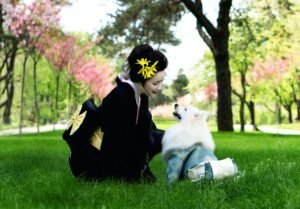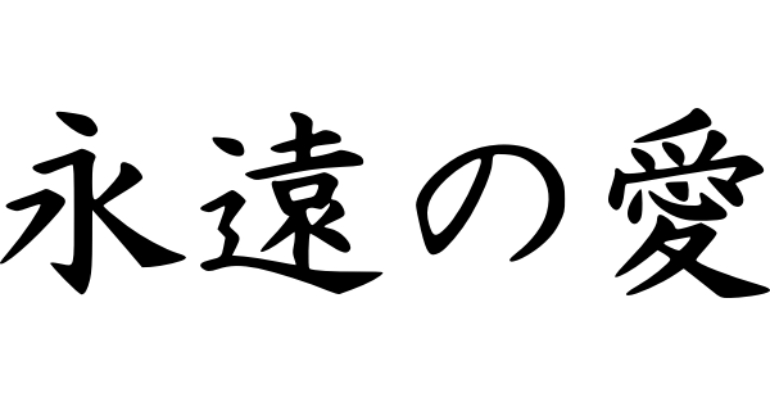If you want to show your love in Japanese, there are several unique words and phrases that perfectly convey your feelings. From beautiful expressions of admiration to romantic Japanese phrases, here are five ways to say “I love you” in Japanese.
あいしてる (aishiteru): “I love you” in Japanese
The most common and direct way of expressing love in Japanese is あいしてる (aishiteru). This phrase can mean both “I love you” or simply “love”, depending on the context. Most notably, it has appeared as a chorus in several famous Japanese songs. It is also sometimes combined with other words to make romantic titles for books, movies, and TV shows.
あいしてる comes from the verb 好き (suki), which means “to like”, and the adverbial form of “I”, 俺 (ore). The latter is usually used by men in casual settings. Together, the syllables create あいしてる , a phrase that expresses love in Japanese. Keep in mind that this phrase is quite direct and obvious when said to someone who is not a romantic partner. Even if you’re just talking about friends or family, this phrase should be used carefully because it implies strong emotions.
When it comes to expressing love for a romantic partner in Japanese, あいしてる is the phrase that’s most commonly used. It can be said after confessing your feelings or when you’re reuniting with the person you love. It’s also popular among couples who are already dating and want to express their strong bond. In addition, some people write this phrase on postcards and give them to their beloved one as a token of their love.Keep in mind that although there are various ways to say “I love you” in Japanese, あいしてる is probably the most direct expression of your feelings.
The literal translation of あいしてる is “I’m loving you” or “I love you in Japanese,” and the phrase communicates your romantic feelings without ambiguity. While there are several different ways to express love in Japanese, it’s important to keep the cultural context in mind. Language learners can benefit from listening to native speakers who use these words naturally, because it will help them coordinate their own language comprehension and build proper pronunciation and intonation for every situation.
Listening to audio with あいしてる is especially helpful because it provides an opportunity to practice gender specific language, since the pronoun and nouns used can vary. Outside of romantic relationships, the phrase may also be used between family members or close friends. It is not considered to be overly formal or too intimate, so learning it early on can be beneficial for the learner who wants to express their feelings in Japanese.

What’s I love you in Japanese?
The phrase is typically composed of two words, 「あい」 and「してる」. The first word is the simple noun for “love” in Japanese, “ai.” This can also be used in other expressions such as the verb 『あいする』(aisuru), which means to “love or care for someone or something deeply.” The second word 「してる」means “to do” and makes the phrase act as a verb rather than just expressing feelings of love. Together, あいしてる (aishiteru) creates the sentence “I love you.”
It doesn’t express more intense feelings like that of longing or obsession, so it may be best suited to intimate relationships between two individuals who already share mutual feelings. If you want to learn more ways to say I love you in Japanese you can alway join our Beginner classes and our teachers will help you that way you can express I love you in a different language.

魅力的な (miryokuteki na): “charming/beautiful”
魅力的な (miryokuteki na) is a great way to express your admiration for someone’s attributes. It can be used to describe both physical or mental charm, and is often said when something has caught the speaker’s eye. You could say 魅力的な to compliment someone’s physical beauty, but also for things like personality traits and skills. Use it in a sentence such as: 「アナタは魅力的な」(Anata wa miryokuteki na) which translates to “You are charming.”
While 魅力的な cannot be strictly translated to “I love you,” it can be used as a way to express admiration and love for someone in the Japanese language. When coupled with actions that show tenderness, such as gentle hugs or holding hands, 魅力的な is a good way to tell someone how much they mean to you.
魅力的な is an expression of love and affection that spans beyond just romantic love. Whether you are speaking to a friend, family member, or a significant other, it works well in conveying the sentiment of how special they are and how much you adore them. It has a lighthearted and airy sentiment perfect for expressing admiration and appreciation for someone you care about deeply. Try it out the next time you show your feelings – 魅力的な!
Telling someone you love them in any language can be intimidating and difficult. But, with a few words to add flair to your confession, like 魅力的な, the task does not become so daunting. Typically after you have said the phrase, “I love you” in Japanese, 魅力的な is usually added as an affectionate final accent. By doing so, it amplifies how much your feelings mean and how special your relationship is. So don’t be afraid to show some extra love with this phrase!
魅力的な in Japanese is a term of endearment, indicating that the person being spoken to holds an uncommon beauty, both inside and out. It conveys admiration, reverence and passion surrounding the love within your relationship. This phrase can be used between friends, family or intimate partners, creating a bond that will last beyond the words themselves. So don’t be afraid to add some extra zing to your “I love you” with 魅力的な!
No matter how you use it or when you say it, 魅力的な is the perfect way to express your admiration for those who bring joy, beauty and love into your life. Whether you’re signing off emails to your friends, telling a relative how much they mean to you or speaking intimately to an intimate partner – adding this special phrase will make a world of difference! So don’t hesitate – use 魅力的な today and watch how seamlessly your words establish a bond that transcends language barriers.

気持ちがいい (kimochi ga ii): “feels good”
気持ちがいい (kimochi ga ii) is a playful and sweet way of expressing how you feel in the presence of someone special. You can use it to describe someone whose company you enjoy, and it’s an excellent expression to share with your significant other. A literal translation is “feels good,” but the phrase implies that the speaker likes being around this person—a feeling that anyone in love understands. Try using 気持ちがいい on a date or when spending time with someone who makes your heart race.
If you really want to spark a flame, 気持ちがいい良かったです (kimochi ga ii yokatta desu) means “it was great that it felt good.” This is the perfect way to express your appreciation for great company without confessing your love outright. Other phrases you could use include 大好きです (daisuki desu), which translates directly to “I really like you,” or 好きです (suki desu), meaning simply “I like you.” No matter what phrase you choose, adding these Japanese phrases can add an extra layer of meaning and emotion to your love life.
If you really want to go for the grand gesture, there are even more romantic phrases you can use like わたしはあなたが好きです (watashi wa anata ga suki desu) which translates to “I love you in Japanese.” Want to make your “I love you” even more special? Try 私はikou yo! (watashi wa ikou yo!), a phrase meaning “Let’s go with me!” that conveys a sense of invitation and longing. No matter which phrase or expressions you choose, learning how to say “I love you” in Japanese is sure to make your declaration of love stand out.
One of the most straightforward phrases to express love in Japanese is 大好き (daisuki), which means “I like you a lot.” If that doesn’t quite capture what you’re feeling, try adding もっと (motto) at the beginning which means “more” to convey an even stronger sentiment. This phrase will become もっと大好き (motto daisuki). Another easy option is 気持ちがいい (kimochi ga ii), or “feels good,” an expression commonly used between close friends and significant others to indicate a strong shared connection.
Of course, 好きです (suki desu) which means “I love you” can also be used to express romantic feelings. While an all-purpose phrase like this is the most popular choice amongst lovers, note that saying すきです can sometimes sound too formal with friends and family and better saved for your crush. If you’re feeling confident enough to communicate in Japanese, even single words like 愛してる (aishiteru) are great choices that clearly demonstrate how deeply you care about someone else.
Another popular phrase to say “I love you” in Japanese is 気持ちがいい (kimochi ga ii). Even though 気持ち (kimochi) can be translated as “feels” or “feeling,” the concept of “feeling good” is used more metaphorically here. So, this phrase can be a much less serious and more entertaining way to express one’s care for another person. If a romantic relationship isn’t desired, this phrase could also be used to convey admiration and appreciation from friends.

時間を共有している (jikan o kyuuyoushiteiru): “sharing time together”
We often forget to appreciate the time we spend with our loved ones, so this is a special phrase you can use in conversations or letters to remind someone that you value moments spent together. 時間を共有している implies that you’d like to share even more of your life with this person—it’s a beautifully understated way of expressing deep care and affection. When using this phrase, it’s best to keep it simple and add a few words of your own. For example, 時間を共有しているのはとても特別なことだね—“sharing time together is such a special thing.”
時間を共有している is a phrase that conveys the feeling of love, companionship and togetherness. This phrase is often used between couples who are in relationships or between friends who have been together for a long time. It`s also often used between family members such as parents and children. Using 時間を共有している to express your feelings doesn’t have to be romantic—it can just mean appreciating and cherishing the time you spend with someone special. In all cases, this phrase conveys your sentiment of joy, happiness, and appreciation for whoever you’re expressing it to.
時間を共有している loosely translates to “We are sharing time together” and it shows that special bond between two people. If you want to say I love you in Japanese, though, there is a more direct way: 私はあなたを愛しています (watashi wa anata o aishite imasu). This phrase directly conveys the sentiment of love, while 時間を共有している expresses your appreciation for the time spent together. No matter which one you choose, your loved one will appreciate the sentiment behind it.
Japanese is one of the most poetic languages in the world. Saying I love in Japanese you can be as simple as uttering two words or as complicated as expressing a thought through carefully-chosen words and phrases. If you are looking for something poetic, try 時間を共有している to express your feelings even more directly. This phrase demonstrates your appreciation for spending time with someone, conveying your admiration through each carefully chosen word. Your loved one will appreciate hearing such a thoughtful phrase, hopefully returning those same kind sentiments back to you.
時間を共有している is a phrase that is used to refer to two people enjoying their time together. The literal translation is “sharing time” or “spending time with each other,” but the intention behind it conveys deeper meaning. It’s an expression of joy and gratitude for shared moments, and recognition for companionship. While not typically used in speaking about romantic love, you could use this phrase to let your significant other know how much you cherish being with them. Hearing a heartfelt expression like this will certainly help strengthen your relationship as it demonstrates how much you care about spending time with your loved one – now and in the future.
Japanese is a complex language with many nuanced ways to express love. If you’re looking for something more direct, then try using “aishiteru” (愛してる), which means “I love you” in Japanese. If your relationship has grown more intimate, then the phrase “anata no kimochi ga suki desu” (あなたの気持ちが好きです) might be more appropriate, as it translates to “I like the way you feel.” Whatever term of endearment you use, your partner will appreciate knowing your feelings!

宝物である (takaramono de aru): “you are my treasure”
This phrase is perfect to express how precious and unique someone is to you. 宝物である conveys the idea that your special one occupies a place in your heart no one else can, as if they were an exquisite gem or priceless artifact that was crafted just for you—an irreplaceable treasure determining their incomparable value.
This phrase has a richer meaning than the traditional “I love you” in Japanese. It is more profound and lasting, as if saying that “you are my treasured possession, no matter how far away or how hard the times may be”. Even when things get difficult, you can rely on this promise of always being loved and cherished.
宝物である (takaramono de aru) is an expression of deep affection and devotion. It expresses a strong emotional attachment to someone, far beyond the feelings expressed by the more casual “aishiteru” (I love you). As such, it is a promise of always being there for your partner no matter how tough times may be. This is a perfect way to express love in Japanese: a phrase that conveys intense emotion without getting overly sentimental or cliched.
宝物である (takaramono de aru) is not just a phrase used among romantic partners, it’s also an expression of love between family members and friends. You can express your love towards a child or even to a pet in the same way. If you want to make someone feel truly appreciated and cherished, use this phrase to show them how much they mean to you. No matter who you’re trying to say “I Love You” to in Japanese, 宝物である (takaramono de aru) will always come across as heartfelt and sincere.
This phrase can be used in many ways. If you want to express to your partner how precious they are to you, try using 宝物である (takaramono de aru) during a romantic moment. It may surprise them with its deep sentiment, so don’t forget to include some thoughtfulness in your delivery. You can also use it during letters or cards from time-to-time; everybody loves receiving an unexpected love message! Whether you’re saying ‘I Love You’ in Japanese or any language, it’s always nice to let people know exactly how special they are.
宝物である (takaramono de aru) translates to mean ‘you are my treasure’, and conveys the full extent of your feelings. By saying 宝物である (takaramono de aru), you’re telling them in a unique way just how special they mean to you. This phrase also has an added bonus of being gender-neutral, so it can be used regardless of the recipient’s gender. Whether you’re telling a friend or your life partner ‘I Love You’ in Japanese, this phrase will certainly brighten their day!
Did you enjoy our post? Feel free to spread the word in Quora with other people discussing how to express I love you in Japanese.







